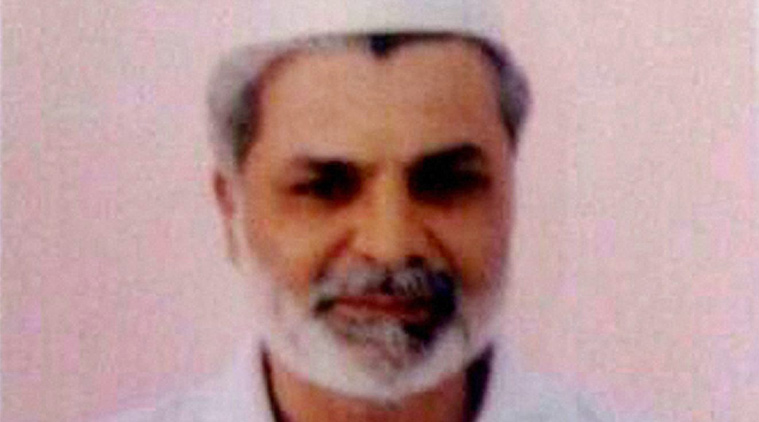Stay updated with the latest - Click here to follow us on Instagram
From warrant to mercy plea, how Yakub Memon’s last appeal failed
Yakub Memon, convicted in the 1993 Mumbai blasts case, was executed today morning at 7 am
 Yakub Memon, convicted in the 1993 Mumbai blasts, was executed at the Nagpur Central Jail today morning at 7 am
Yakub Memon, convicted in the 1993 Mumbai blasts, was executed at the Nagpur Central Jail today morning at 7 am
The petition against Yakub Memon’s death sentence had raised three main arguments, each struck down by the Supreme Court Wednesday. Yakub was represented by Raju Ramachandran and T R Andhyarujina, the Maharashtra government by attorney general Mukul Rohatgi. How they argued:
Validity of death warrant
YAKUB’S COUSEL: Illegal, since it was issued by a TADA judge in Mumbai though Yakub was yet to file a curative petition… A death warrant can be quashed if issued without waiting for convict to avail all legal remedies. Yakub had to be heard before issuance of the warrant. The warrant was issued on April 30, he was informed only on July 13.
MAHARASHTRA: No legal process was under way and the judicial process had exhausted… President rejected his mercy plea in April 2014. In September 2014, Supreme Court held that review petitions of death-row convicts have to be heard in open court. Yakub moved a second review petition, dismissed this year. TADA judge on April 30 issued a fresh death warrant for execution on July 30. Yakub had not filed any curative petition; nothing was pending. Further, judge gave him three months’ time to avail all possible remedies available. He was informed about the date of execution on July 13, which fulfils the norm of at least 14 days.
COURT: “We find issuance of the death warrant is in order. We don’t find any fallacy… As far as compliance with the minimum period of intimation is concerned, it meets the time limit.”
Curative petition rejection
YAKUB’S COUNSEL: The decision rejecting the curative petition was improper as the judges who had heard the review petition were not on the bench that junked the curative plea. “Complete strangers to my case heard the curative petition,” complained Yakub’s counsel. Chief Justice of India H L Dattu, Justices T S Thakur and Anil R Dave decided the curative plea; Justices J Chelameswar and Kurian Joseph had, along with Justice Dave, heard the review plea.
MAHARASHTRA: CJI is the master of the rosters in the Supreme Court and he can constitute any bench to hear a case unless the rules provide otherwise… There is a rationale behind having the three senior-most judges on the curative bench.
COURT: Attorney general has driven the point home. We are not going to sit over the judgment whether the curative plea was rightly decided or not but as far as composition of the bench is concerned, there is no procedural violation. Supreme Court rules state it is the prerogative of the CJI to include other judges but non-exclusion will not make the process void.
Fresh mercy plea
YAKUB’S COUNSEL: The previous mercy plea dismissed by the President in April 2014 was moved by Yakub’s brother. Now, he has moved a fresh plea before the governor. Now that his curative petition is also dismissed, his mercy plea deserves consideration and till a decision, the execution ought to be stayed. The fresh plea has cited changed circumstances including schizophrenia. Also, new facts have come to light in view of a former R&AW officer’s article stating that Yakub was assured by the investigative agency that he will not be hanged. Even if the governor chooses to reject the fresh mercy plea, a fresh 14-day notice will have to be given.
MAHARASHTRA: The judicial process is over after full play. It has attained finality. A “traitor” responsible for killing 257 people has already been shown enough indulgence; 23 years have gone by and the agony of those whose kin lost lives in this attack has been reduced to mere photographs. A person cannot keep delaying an execution by filing endless petitions.
COURT: A convict can move a mercy petition at any stage of the judicial process and in Yakub’s case, his mercy petition was rejected by the President in April 2014. Rejection of a mercy petition can be challenged on limited grounds but the court does not require to deal with it in this case since Yakub has not contested this dismissal.
“How the mercy petition is going to be dealt with, we are not going to delve into that. We find issuance of the death warrant is in order. We don’t find any fallacy. We thus conclude that the decision in the curative plea is not flawed and the issuance of the death warrant cannot be faulted. In the result, the writ petition is sans merit and is dismissed,” stated the order.







